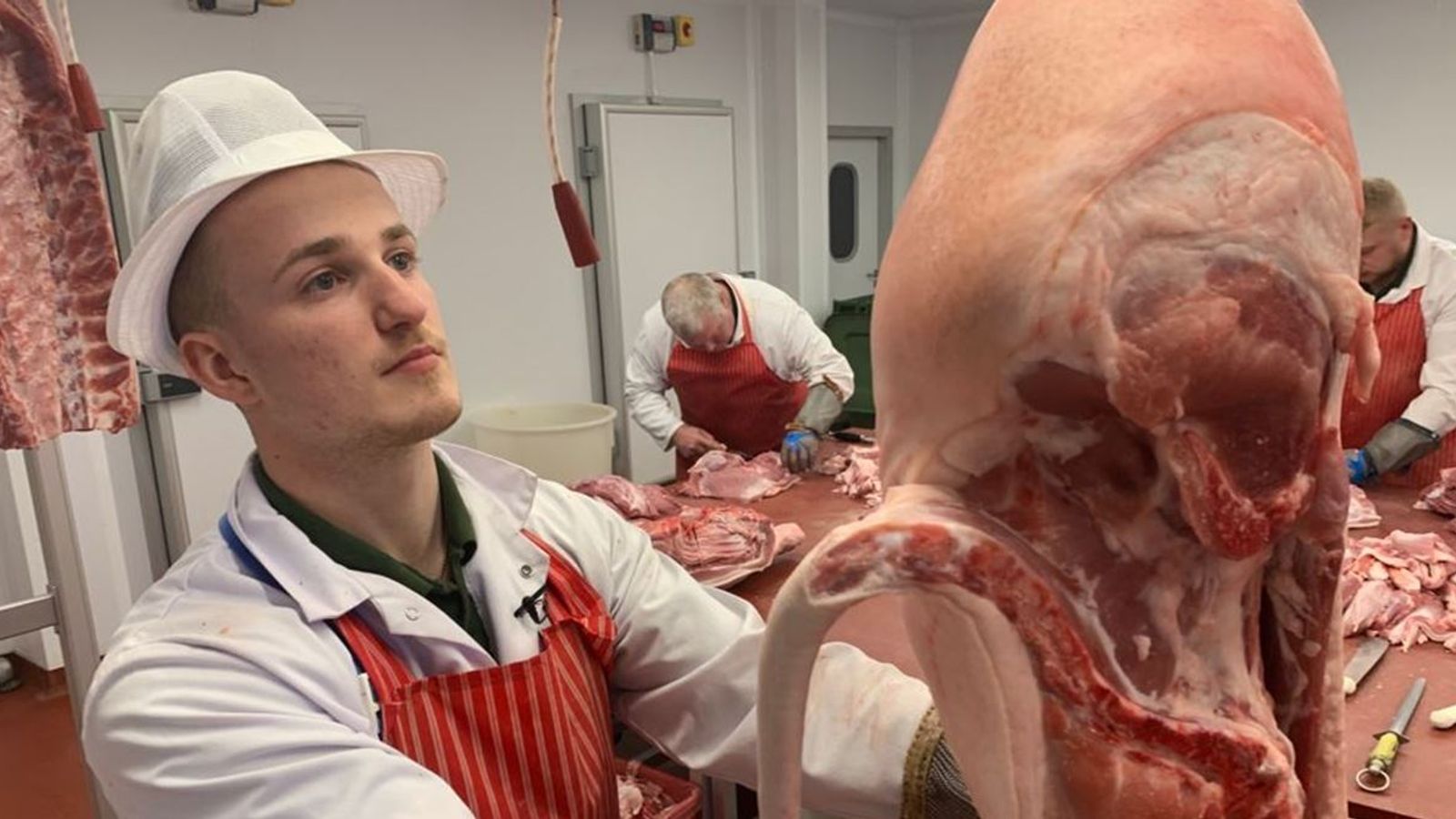Jack Western is unusual. He’s young, he’s British, and wants to be a butcher.
“I’m the only person I went to school with or in my friendship group who’s a butcher,” he says, on shift preparing pork at Essington Farm, a field-to-shop family business near Wolverhampton.
“It’s a bit of a dying trade with the younger generation. I think there’s a lot of stigma because people don’t understand much about it.”
Mr Western is one of around 400 apprentices who take up butchery in England every year, a number that’s growing, but not fast enough to fill the gaps left by Europeans who have left in the last 18 months.
The shortage has left some large farms warning they may have to cull pigs because processing plants do not have the necessary labour, and industry bodies have asked the government to grant temporary visas to ease the problem.
So far ministers have refused, with Boris Johnson seemingly untroubled, telling interviewers the pigs will be killed irrespective of whether they reach the food chain or not.
It has left the industry as a test case for an economic experiment in which the “stresses and strains” of the supply chain crisis are recast as the necessary price for replacing “uncontrolled immigration” with high-skilled, high-paid British workers.
Bank of England warns over threat of sharp market fall amid economic jitters
Boris Johnson appoints ex-Tesco boss as ‘expert supply chain adviser’ to ease crisis
Supply crisis: Eight million Britons unable to buy essential food items in last fortnight, ONS survey suggests
Essington Farm cuts and sells all its own meat on-site, and owner Will Simkin says he has been developing a supply line of butchers, hired from the local area, for several years. He believes his approach should be the aim for the industry, but it will take time.
“Brexit and COVID have conspired to create a shortage, although it is worse for the large meat processors,” he says.
“We’ve got young butchers, older butchers who are more experienced, and that model needs to be throughout the trade, that will solve it. But it takes years to train a butcher, three, four, five, even six years years until they get to a standard, so it’s not going to happen overnight.”
Crosby Butchery Training work with around 100 apprentices every year, and Mike Whittemore agrees that increasing the domestic workforce is possible.
“It’s not new news that there is a shortage, but we’re in a better place than we were five years ago,” he said. “There’s a lot more interest in the trade because the pay is better, the conditions are better. Five years ago there were only 150 apprentices a year, now it is 400, and that speaks volumes. But it takes six years to fully train a butcher.”
That timeframe means there is no swift solution to the problem of pigs backing up on farms around the country, a problem the government was warned was coming over a year ago.
Please use Chrome browser for a more accessible video player
Last spring the independent Migration Advisory Committee (MAC) told the Home Office that 70 occupations, covering around 14% of all employment, would need to recruit from abroad to avoid potential labour shortages.
The MAC recommended that 20 roles, including butchers, bricklayers, welders, care workers and nursing assistants, be added to the Shortage Occupation List, which exempts workers from the £26,500 salary threshold introduced in the post-Brexit points-based immigration system.
The Home Office said no to all but the care and nursing roles.
Madeline Sumption, director of the Migration Advisory Committee and a member of the MAC, told Sky News it was unclear how long the current disruption would last. But she said it was doubtful British workers would fill all the vacant roles. Instead, farms are likely to produce less, and shops become more reliant on imports.
“Larger employers will be able to invest in automation and rely less heavily on workers, and I think smaller employers are more likely to go out of business,” she said.
“In the long run what we will probably see is the composition of the economy will be different, that the UK will not be doing as many of these labour intensive activities, and just importing meat from abroad.”
If that is the case Mr Johnson may be able to claim success, but only if workers are more productive. If not companies and consumers may pay the price for weaning the economy off the single market for labour.






















